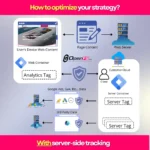What are the Most Effective SEO Strategies to Boost Rankings in 2025?
The short answer? Focus on creating genuinely helpful content that matches what people are actually searching for, while making sure your website runs smoothly on all devices. But that barely scratches the surface.
I’ve been knee-deep in SEO work here in Jersey for over a decade, and if there’s one thing I’ve learned, it’s that ranking well isn’t about gaming the system anymore. Google’s gotten scary good at figuring out which sites actually help users versus which ones are just trying to rank.
Why Most SEO Advice Falls Short
You’ve probably read a hundred articles telling you to “optimize your keywords” and “build quality backlinks.” Yeah, those matter, but they’re like telling someone to “score goals” to win at soccer. No kidding.
What really moves the needle? Understanding that SEO in 2025 is about building trust signals across multiple dimensions. I watched a client’s plumbing site tank after following generic SEO advice to the letter. They had perfect keyword density, clean meta tags, the works. But their content read like it was written by someone who’d never touched a pipe wrench.
Meanwhile, their competitor – a guy who barely knew what meta descriptions were – was crushing it because he answered real questions plumbers get asked every day. His grammar wasn’t perfect, but people trusted him.
The Trust Factor Nobody Talks About
Google’s E-E-A-T framework isn’t just algorithm speak – it’s how real people evaluate information. When someone lands on your page, they’re asking:
- Does this person know what they’re talking about?
- Can I trust this information?
- Will this actually help me solve my problem?
I learned this the hard way when we revamped a medical practice’s website. We spent months perfecting the technical SEO, but rankings stayed flat. Then we added simple things like the doctor’s actual experience treating specific conditions, before-and-after case studies (with permission), and honest discussions about treatment limitations. Rankings jumped within weeks.
Technical Foundations That Actually Matter
Look, I’m not gonna pretend technical SEO is exciting. But ignoring it is like building a house on sand. Here’s what actually impacts rankings:
Site speed – Not just for desktop. I’ve seen sites lose 40% of their mobile traffic because they took 6 seconds to load. Use Google’s PageSpeed Insights, but don’t obsess over getting 100/100. Focus on real improvements users notice.
Mobile experience – This isn’t 2015 where “mobile-friendly” meant your site didn’t break on phones. Modern web design needs to feel native on mobile. Buttons you can actually tap, text you don’t need to zoom in to read, forms that don’t make you want to throw your phone.
Crawlability – If Google can’t find and understand your pages, nothing else matters. Check your robots.txt, fix broken internal links, and make sure your XML sitemap actually includes all your important pages.
The Security Thing Everyone Ignores
HTTPS isn’t optional anymore. I had a client refuse to pay for an SSL certificate because “we don’t sell anything online.” Three months later, Chrome started showing security warnings on their site. Their traffic dropped 60% overnight. Don’t be that guy.
Content Strategy That Ranks (Without Sounding Like a Robot)
Here’s where most businesses mess up – they create content for search engines instead of humans. I get it, you want to rank for “best pizza in Newark” or whatever your target keyword is. But stuffing that phrase 47 times into a 500-word article isn’t fooling anyone.
What works? Writing like you’re explaining something to a friend. Use your target keywords naturally, sure, but focus on actually being helpful. Good SEO copywriting reads smoothly while hitting the right search terms.
I worked with a roofing company that wanted to rank for “roof repair Morris County.” Instead of writing fluff about “professional roof repair services,” we created guides on identifying hail damage, when to repair vs. replace, and honest cost breakdowns. Those pages started ranking within a month and actually converted visitors into calls.
The Keyword Research Reality Check
Everyone obsesses over search volume, but here’s what matters more: intent and competition. A keyword with 10,000 monthly searches means nothing if you’re competing against Home Depot and Lowe’s.
Better approach? Find the questions your actual customers ask. Use tools like Answer the Public or just… talk to your sales team. Those weird, specific long-tail phrases often convert better anyway. Smart keyword research is about finding opportunities, not chasing vanity metrics.
Link Building Without the BS
Okay, let’s address the elephant – backlinks still matter. A lot. But buying links from “SEO guru” email spammers is a fast track to penalties.
What actually works for building quality backlinks? Creating stuff people want to reference. Data studies, original research, useful tools, comprehensive guides. Yeah, it’s harder than buying links. It also actually works long-term.
Local businesses have an advantage here. Get involved in community events, sponsor local teams, collaborate with other businesses. Those local news mentions and chamber of commerce links? Gold for local SEO.
The AI Search Revolution Nobody’s Prepared For
Google’s AI overviews are changing everything. I’m seeing sites lose traffic even when rankings stay the same, because Google’s answering questions directly in search results. Understanding AI’s impact on search isn’t optional anymore.
The sites surviving this shift? They’re going deeper. Instead of “what is X?” content, they’re creating “how to actually implement X in your specific situation” guides. Surface-level content is dying.
Voice Search and Featured Snippets
People search differently when they’re talking to Alexa or Google Assistant. “Pizza near me” becomes “Hey Google, where’s the best pizza place that’s open right now?”
Optimizing for voice search means structuring content to answer conversational queries. Use question-based headers, provide direct answers in the first paragraph, then elaborate. It’s also how you win featured snippets.
Local SEO: The Competitive Advantage
If you serve a specific area, local SEO is your secret weapon. Big national brands can’t compete with your local knowledge and connections.
Start with Google Business Profile optimization. Fill out every field, add photos regularly, respond to reviews (even the bad ones – especially the bad ones). Get your NAP (Name, Address, Phone) consistent everywhere online.
But here’s what most miss: create location-specific content that actually helps locals. Not just “We serve [City Name]” pages, but guides to local events, partnerships with other local businesses, content that shows you’re actually part of the community.
Measuring What Matters
Rankings are nice, but they don’t pay the bills. I’ve seen sites ranked #1 for their target keywords that barely get any calls. Why? They ranked for the wrong terms, or their site convinced visitors to look elsewhere.
Track these instead:
- Organic traffic to key pages (not just homepage)
- Conversion rate from organic traffic
- Which keywords actually drive revenue
- Time on site and pages per session for organic visitors
- Phone calls and form submissions from search
Use Google Analytics properly and you’ll spot opportunities everyone else misses.
The Long Game Wins
Here’s the thing about SEO – there’s no magic bullet. I’ve watched too many businesses chase the latest “hack” only to get slapped by the next algorithm update. The sites that consistently rank well? They focus on being genuinely useful.
Sure, optimize your title tags, build some links, fix your site speed. But if your content doesn’t actually help people, you’re just rearranging deck chairs on the Titanic.
Start with one piece of truly helpful content. Answer a real question your customers have. Make it comprehensive without being boring. Then do it again. And again. That consistency, combined with solid technical foundations, is what builds lasting rankings.
Want to shortcut years of trial and error? Sometimes it makes sense to work with SEO professionals who’ve been through the trenches. But whether you DIY or hire help, remember: search engines are just trying to connect people with helpful information. Be helpful, and the rankings follow.
Frequently Asked Questions
How long before I see results from SEO efforts?
Honestly? It depends on where you’re starting from and how competitive your market is. New sites typically see initial movement in 3-4 months, with more significant results around the 6-month mark. Established sites fixing technical issues might see improvements in weeks. But here’s the catch – SEO is cumulative. The work you do today might not show full results for months, but it compounds over time.
Should I focus on getting more backlinks or creating better content?
It’s not an either/or situation, but if I had to choose, content wins. Great content naturally attracts links over time. Mediocre content with tons of paid links? That’s a house of cards waiting to collapse. Focus on creating resources people actually want to reference, then promote them strategically. The links follow.
Is it worth optimizing for AI search features like Google’s AI Overviews?
Absolutely, but not at the expense of traditional SEO. Structure your content to directly answer questions in the first paragraph, then provide deeper context. Use clear headings, bullet points, and concise explanations. Even if AI pulls your content for an overview, users often click through for more detail – if you’ve hooked them with valuable information upfront.
 Written by: Romulo Vargas Betancourt
Written by: Romulo Vargas Betancourt
CEO – OpenFS LLC







